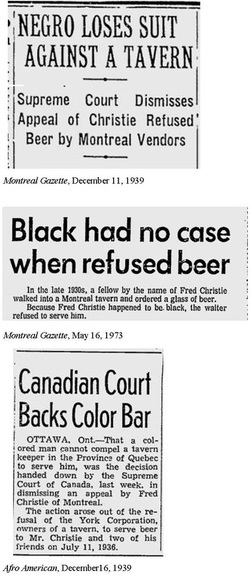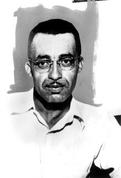 “The root cause of [racial discrimination] is ignorance. People act this way because they don’t know any better and education will bring them out of this. And the law will force the people to educate them because the law will have a penalty attached to it if they break the law and they’ll have to suffer a penalty, so they’ll be prepared by being educated, not to discriminate.” - Rev. Emerson Andrew Talbot (Queen Street Baptist Church, Dresden), Dresden Story, 1954 On July 11 1936, African Canadian Fred Christie was refused service at the York Tavern in the Forum in Montreal after watching a Canadiens hockey game with friends. Christie sued and won in provincial court. Christie was awarded $25 and the tavern was ordered to pay his court costs. However, the tavern owners successfully appealed. Determined, Christie took his case all the way to the Supreme Court of Canada. They dismissed his case, arguing that private businesses and discriminate based on race. The high court did not see that denying service to a person because of their race was "contrary to good morals or public order." Fred Christie’s brave stance ushered in another chapter in the freedom movement of African Canadians. Hugh Burnett also entered the battle against racial discrimination during the month of July. In July 1943, Burnett, who just returned from serving in Europe, wrote a letter to federal Justice Minister Louis St. Laurent to complain that he was denied service at a Dresden, Ontario restaurant while donning his military uniform. St. Laurent replied that racial discrimination was not against the law in Canada. Burnett began his participation in a growing movement to push for this legislative change. Members of the National Unity Association (which included Hugh Burnett), Bromley Armstrong, and many Black Canadians along with other human rights activists such as Ruth Lor Malloy, used Dresden as the "battleground" in the fight for human rights legislation. Success finally came with the enactment of the Fair Accommodation Practices Act passed on April 6th, 1954. The 60th anniversary of the passage of the Fair Accommodation Practices Act passed three months ago without acknowledgement by the government at any level, an article in the press, or coverage in the news. Armstrong has justly received personal accolades including the Order of Canada and the Order of Ontario. Hugh Burnett and his organization, the National Unity Association, received a plaque four years ago, but that is the only public memorial for people who played a pivotal role in turning the tide in the struggle against racial discrimination. The Kielburger brothers pointed out the glaring absence of their names on a list of influential Canadians in a recently published article, Why Are There Mostly White Males on the Canadian Heroes List? The existence of the Fair Accommodation Practices Act, Human Rights Codes, the Charter of Rights and Freedoms, and the immigration points system, are due in no small part to the efforts of Black activists who pressed and agitated for equality and human rights. How can citizens call for a social justice agenda when we continue to deny the reality of the fight against racial injustice in our own society? We could learn something from our neighbours to the south who bring their history, however tainted, to the fore, acknowledge their past, and honour the work of civil rights activists. In the United States, to mark the Freedom Summer and the 50th anniversary of the Civil Rights Acts, there were documentaries and discussions on public and private television networks, educational organizations made it a point to increase public awareness through youth forum, workshops, and learning resources. Archives digitized and made public images and documents. President Obama saw fit to address this civil rights milestone at least one speech. It is important for students in Canadian classrooms to learn about the historic inequalities experienced by African Canadians and their legacies that remain with us today. The stories of the men, women, and groups involved in the human rights movement and who served as agents of change should be taught. The present-day implications and unfinished business of the Canadian journey toward equality need to be part of the exploration of civic engagement and social justice. As part of my commitment to bringing this information into the classroom, I have been working with Turner Consulting Group to develop a curriculum resource, “Black in Canadian Human Rights and Equity History.” These lesson plans and other resources for teachers will be launched in September 2014. It is our hope that elementary and secondary school teachers will be encouraged to use these learning materials to teach students about Canada’s human rights movement and motivate young people to continue the fight against racism in its many manifestations. Hopefully when then next set of anniversaries roll around, these front line activists will get the respect and public memorialization they rightly deserve. |
AuthorNatasha Henry Archives
October 2023
Categories
All
|


